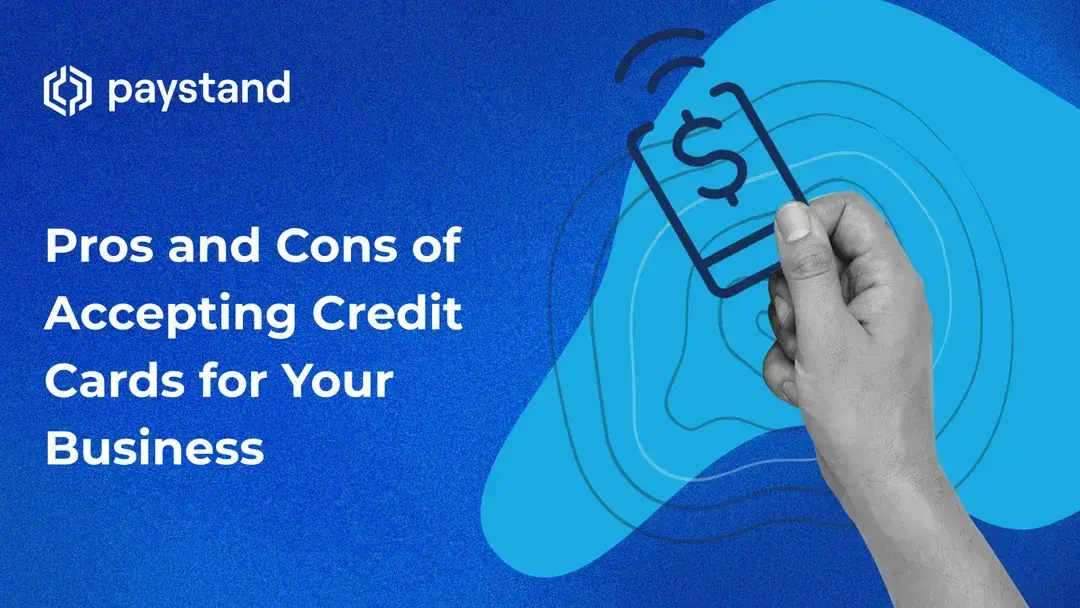The Pros and Cons of Credit Cards in B2B Payments

Table of Contents
- The current state of B2B payments
- Pros of accepting credit cards for B2B transactions
- Cons of Accepting Credit Cards for B2B Transactions
- What are 5 disadvantages of a credit card?
- What are 5 advantages of credit cards?
- What are the risks of a credit card?
- Alternatives to Credit Cards for B2B Payments
Key Takeaways
- Convenience: Credit cards offer speed, flexibility, and global reach, benefiting businesses with international operations.
- Improved Cash Flow: Faster payment processing compared to checks helps reduce DSO and supports cash flow.
- High Fees: Credit card processing fees (around 3%) can impact profit, especially on large B2B transactions.
- Security Risks: Credit cards increase fraud exposure, requiring businesses to implement secure practices.
- Alternative Options: ACH, wire transfers, and Paystand’s Bank Network offer cost-effective, secure alternatives.
- Balanced Approach: Using a mix of payment methods can optimize costs, security, and cash flow.
In today’s fast-paced digital economy, businesses need efficient payment methods to stay competitive. Credit cards have become one of the most popular payment options, not only in B2C markets but increasingly in B2B as well. While they offer convenience and global acceptance, credit cards come with challenges that can impact business finances and security. This guide breaks down the pros and cons of accepting credit card payments and explores alternative solutions to help businesses make informed payment decisions.
The Current State of B2B Payments
As e-commerce expands and B2B payments grow, accounts receivable (AR) departments face rising payment volumes and increased pressure to adopt efficient systems. Many businesses still rely on legacy systems that hinder payment reconciliation, making it difficult to process payments and balance books accurately.
Without integrated digital systems, processing payments and managing cash flow can become inefficient, leading to:
- Higher Operating Costs: Manual processes increase administrative costs.
- Errors and Poor Visibility: Outdated systems can lead to errors and reduced visibility in the payment cycle.
- Longer DSO (Days Sales Outstanding): Payment delays directly impact cash flow.
According to Mastercard, during the COVID-19 pandemic, 82% of companies reported changing their payment methods to keep up with shifting demands. Increasing digital security concerns have also pushed businesses to seek safer payment methods with advanced protections, including blockchain and encryption.
Pros of Accepting Credit Cards for B2B Transactions
Credit cards offer several advantages for businesses, especially those with a diverse customer base or international reach:
- Convenience and Flexibility: Credit cards offer a fast, easy payment option suitable for businesses of all sizes. Accepting cards allows for immediate payments from customers who are ready and able to pay, which helps streamline AR processes.
- Global Reach: Credit cards simplify international transactions by handling conversion fees and customs seamlessly, making them ideal for businesses with global operations.
- Faster Payment Processing: Credit cards generally process payments faster than traditional methods like paper checks, which can improve cash flow and reduce DSO, providing more funds for business growth and investment.
Cons of Accepting Credit Cards for B2B Transactions
While credit cards offer convenience, there are also significant drawbacks that businesses should consider:
- High Transaction Fees: Credit card companies typically charge around 3% per transaction, which can add up quickly, especially for B2B transactions involving larger sums. Credit card processing fees reduce profit margins and are often higher for international payments due to exchange rates.
- Increased Fraud Risk: Credit cards expose businesses to cybercrime and fraud risks. Since fraudulent charges typically affect the seller, accepting credit cards can increase potential losses from cyber attacks and theft.
- Administrative Burden: Errors like incorrect card details or expired accounts can lead to failed transactions, creating bottlenecks and requiring additional follow-up. Each failed transaction requires tracking the customer and setting up alternative payment methods, adding to administrative workload.
- Credit Card Holds: Temporary holds on credit cards protect against fraud but can also lead to transaction delays and penalties. Credit card holds are placed by issuers to verify funds, preventing card use until the transaction completes or is canceled.
What are 5 disadvantages of a credit card?
- High-Interest Rates on Balances: Unpaid balances often accrue high-interest charges, which compound monthly.
- Risk of Debt: It’s easy to accumulate debt when overspending or making only minimum payments.
- Fees: Common fees include annual fees, late fees, cash advance fees, and foreign transaction fees.
- Credit Score Impact: Late or missed payments can damage credit scores significantly.
- Temptation to Overspend: Having available credit can lead to unnecessary purchases and financial strain.
What are 5 advantages of credit cards?
- Convenience: Credit cards are accepted almost everywhere, making it easy to shop online or in person without cash.
- Rewards Programs: Many cards offer cash back, travel points, or rewards on every purchase.
- Fraud Protection: Credit cards offer strong fraud protections, often with zero liability for unauthorized transactions.
- Credit Building: Responsible use can improve your credit score, aiding in loan approvals and better interest rates.
- Emergency Funds: Access to a credit limit allows immediate funds in unexpected situations.
What are the risks of a credit card?
- Debt Accumulation: It’s easy to accumulate high debt, especially with interest charges on unpaid balances.
- Negative Impact on Credit Score: Missed or late payments, along with high balances, can lower your credit score.
- Financial Fees: Penalties, fees, and interest charges can add up quickly, making it costly to carry a balance.
- Fraud and Theft: Although credit cards have fraud protection, there’s still a risk of identity theft if your information is compromised.
- Overspending: Easy access to credit can lead to impulsive purchases, resulting in financial strain.
Alternatives to Credit Cards for B2B Payments
Offering a range of payment methods can help businesses reduce costs, improve security, and meet diverse customer preferences. Here are some popular alternatives to consider:
- Checks: While slower and more labor-intensive, checks remain a standard payment method in certain industries. To encourage a shift to digital payments, businesses can offer incentives or simplify the AR process for customers willing to transition.
- ACH Payments: The ACH (Automated Clearing House) network supports secure, low-cost electronic transfers within the U.S. ACH payments are faster than paper checks, generally taking three business days to process, and incur lower fees than credit card transactions. They also minimize account churn, making them a reliable option for recurring payments.
- Wire Transfers: Wire transfers provide immediate, direct bank-to-bank payments and can be used internationally. They offer immediate fund availability but come with additional fees and are non-reversible once completed.
- Paystand Bank Network: Paystand’s Bank Network provides a zero-fee digital payment option for businesses, covering 90% of the U.S. banking market and 98% of commercial accounts. Real-time fund verification and Assurety blockchain technology offer secure, transparent payments. By using Paystand, businesses can avoid transaction fees, benefit from automated payment settlements, and eliminate follow-ups and chargebacks.
Making the Best Payment Choice for Your Business
The payment landscape rapidly changes as businesses adopt more digital solutions and focus on secure, efficient methods. While credit cards remain a popular option due to their flexibility and convenience, high fees and security risks can make them challenging for some businesses. Exploring alternatives like ACH payments, wire transfers, or Paystand’s Bank Network can help companies find the right balance of efficiency, cost, and security.
If you're ready to discover how Paystand can help streamline payments and optimize your AR process, download this ebook about digital payments to learn more. Our payment solutions provide all the tools you need to get paid faster and more efficiently.








%20(1)%20(1).jpg?width=100&height=100&name=IMG_3752%20(1)%20(1)%20(1).jpg)